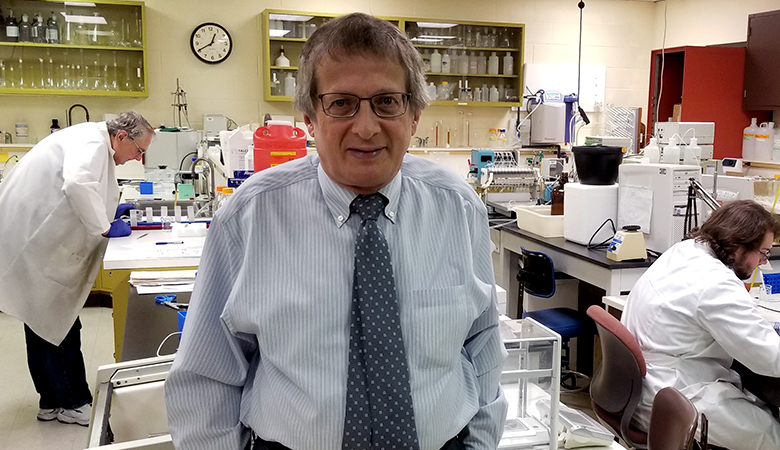Dr. Stephen Lasley Reflects on 33 Years at UICOMP

Introduction
Professor Stephen Lasley, Ph.D., retires from the University of Illinois College of Medicine Peoria this month, after a 33 year career devoted to research and medical education. With neuroscience as his research focus, specifically neurotoxicity, he was recruited to Peoria from an osteopathic medical school in Fort Worth, Texas. One key attraction that Peoria offered was collaboration opportunities with other faculty in neuroscience. In the area of medical education, much of his focus has been pharmacology coursework. Under the old curriculum, he was course director for 11 years and assisted with the curriculum prior to that. With the new curriculum, Dr. Lasley is the college-wide leader of Block 7, “Regulation and Reproduction.”
Reflecting on the changes he has witnessed during his tenure at UICOMP, the curriculum transition to a more active learning style and the increasing availability and use of technology are two of the most profound transitions. The biggest change he cites is the unified College of Medicine across all campuses of the University of Illinois at Chicago. “To produce an identical curriculum across the three College sites, we had to develop more unity of effort across the campuses, and I have had the privilege of working with some very dedicated people,” he shares. “We have a very good alliance.”
Among his research findings that bring him the most satisfaction, there are two. In the early '90s, his lab was among the first to show how lead toxicity in live animals created the physiological basis led to cognitive impairment in children. Second, his later research contributed to general progress showing how the vague amorphic disorder of Gulf War Illness was caused by combined exposure to an anticholinesterase (a drug given to troops to counter the potential effects of nerve gas exposure) and an insecticide in the presence of the stress of a war environment. His research with collaborators demonstrated that these exposures led to central nervous system inflammation in animal models.
Anticipating retirement, he shares, “You hate to walk out. Most faculty are at the peak of their career or close when they retire. When you are not doing research anymore, it’s like you lose a part of your identity.” That’s why affiliations with grant review panels and editing for scientific journals are in his post-retirement plans, which also include a move to Kentucky.
“It’s very rewarding to be on a highly committed team,” he says of his UICOMP career. “This was true of my research department and true of the teaching faculty as well as the College administration.”
UICOMP Interim Regional Dean Meenakshy Aiyer expressed gratitude for Lasley’s commitment to excellence and service. “Dr. Lasley’s diligence and dedication to research as well as his contributions to educating future physicians are immeasurable. His dedication to neuroscience discovery and research have contributed to improving lives through better diagnoses and treatments,” Aiyer says. “On behalf of the University of Illinois College of Medicine Peoria, I want to extend my most sincere congratulations on his successful career and thank him for his loyal service.”